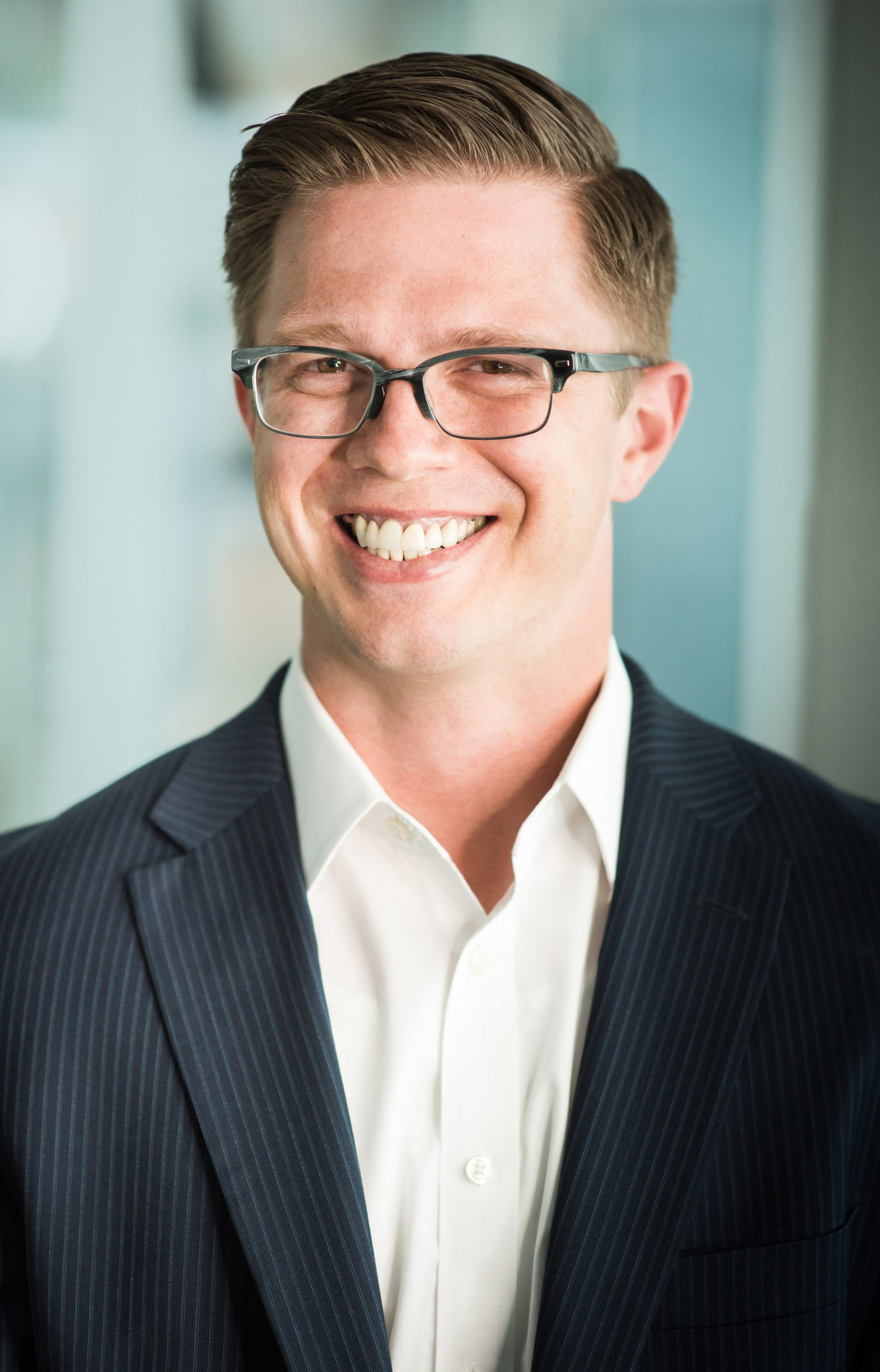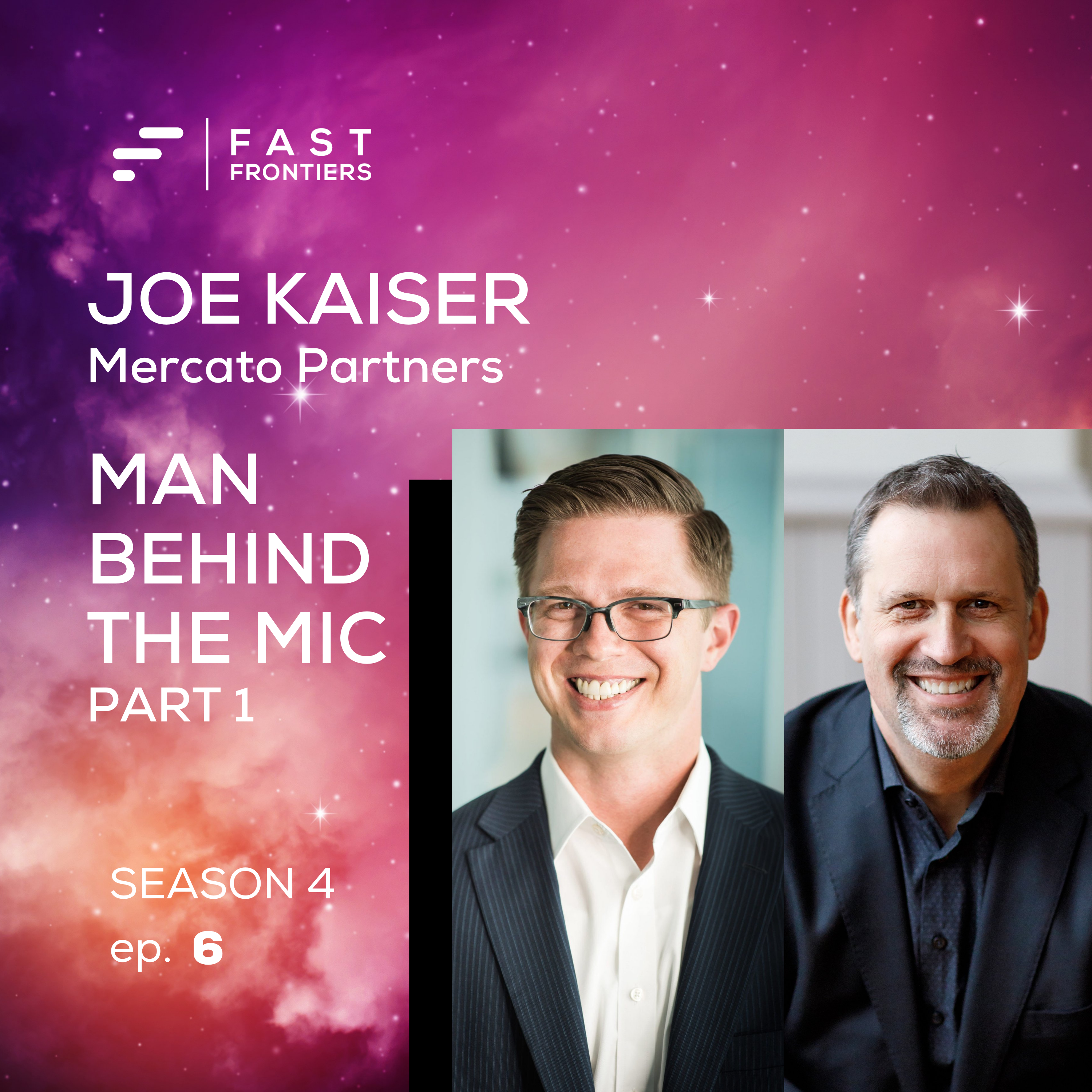S4 Ep 6. Man Behind the Mic Part 1: Interview by Joe Kaiser at Mercato Partners
- 0.5
- 1
- 1.25
- 1.5
- 1.75
- 2
Tim Schigel: Welcome to Fast Frontiers, I'm your host, Tim Schigel, Managing Partner of Refinery Ventures. In this episode, we're doing something different. This is our Man Behind the Mic episode where I'll be interviewed by my friend Joe Kaiser. Joe's a Director at Mercato Partners, a private equity firm where he leads the firm's investment efforts in the Midwest, as well as its performance team. A huge thank you goes out to Joe for coming up with this idea and giving us his time and thoughtful questions. He was kind enough to switch seats and put me in the hot seat for this interview. For part one, we're going to dive into why we started Fast Frontiers, my experience and journey as a CEO, operator, fund to funds manger and VC investor. We'll discuss the origin and thesis for Refinery Ventures. Please enjoy part one of my Man Behind the Mic conversation with Joe Kaiser.
Joe Kaiser: Hi, I'm Joe Kaiser and I'm thrilled today to have the opportunity share with you a Man Behind the Mic version of Fast Frontiers with Tim Schigel, the Founder of both Fast Frontiers and Refinery Ventures. Tim, how are you today?
Tim Schigel: I am excellent.
Joe Kaiser: Well I have obviously followed every season so far, I've learned a ton from all of your guests and from just talking to you. So I'm thrilled to offer the audience and opportunity to hear your insights into investing and how to build companies from the earliest stages through exit. So with that though, I thought we could start with, why did you start Fast Frontiers?
Tim Schigel: Excellent question, always start with the why. Thanks also, Joe, for doing this and for suggesting the idea. I've been asking the questions, which has been the best part and easiest part of a podcast because I just have really smart guests on and they do all the work, and that's the secret to podcasting. So, putting me on the spot here, but I really appreciate you coming and doing this. So Fast Frontiers, the tagline is, it's about how innovations accelerate in unexpected places. I really didn't see much content in that niche. Obviously I'm coming at it from a venture and tech entrepreneurship background, but there were several vectors. We talk a lot about innovation generally, as investors obviously our life blood is innovation. I've done a lot with working with big companies who are very focused on innovation. So innovation's a very popular topic, innovation can happen in a lot of different places, and places can be geographic, and they can be metaphorical. So they can be within healthcare, within various industries, they could be in places like the Midwest or in Cincinnati, which is really how it started, but it seems to be a broader topic than just the geography and there are some similarities. So we could have interesting folks from entrepreneurs to investors to researchers, academics, community builders, so it really gives us a lot of space to play and if you're... It dawned on me, I've done a lot of work, I've had a place or worked in Silicon Valley off and on for 30 years and there's such a density and concentration of all those people mixing it up every day. You bump into them at Starbucks, you see them at work, everywhere. I go back to Cincinnati, and I wouldn't walk into a Starbucks and run into somebody from Google by chance like the one out there. So the challenge we have geographically like in the Midwest is, we don't have that density. So it finally, actually another one of our advisors suggested that I do this because they're like, " Hey, you know a lot of interesting people," I'm not heavily on social media pushing that sort of thing, but it's like, hey, when I'm having interesting conversations with interesting people, why not share them with others? Why not share some of the things that I've learned and that I continue to learn with others in places that are unexpected, that aren't necessarily Silicon Valley and Boston, New York corridor. So, I know that's a long answer, but a lot of those things were bumping around in my head that finally led me to creating the podcast, and ultimately the podcast is here to serve the entrepreneur. To hopefully help the entrepreneurs learn something or feel more confident in their journey or be inspired by others.
Joe Kaiser: Yeah, it's compelling because it serves the virtual purpose of the coffee shop conversation I think, that you were just talking about in the Bay Area. But Tim, one of the things that I've always found fascinating about our conversations, I think it's important for an investor to have sat at multiple seats around the table, but you've redefined what sitting around multiple seats around the table means. Just for the audience's benefit, can you describe, you've been an operator in multiple geographies, you've been multiple type of investor. Can you give the audience just your both operation and investing background?
Tim Schigel: Sure, yeah, it's yeah, it's either unique or unfocused, whatever you want to, however you want to label it. I think of myself first and foremost as a tech entrepreneur, so that's how I think about myself operating in these different contexts. I was early on, my degree is in electrical engineering, so I've always been drawn to technology. Early on I became a guru in customer driven design, and that took me all over the world, helping Hitachi in Japan and Daewoo and Samsung in Korea, and US companies. Ultimately had no idea I could get into venture business without leaving Cincinnati, I thought I had to move to Silicon Valley. So, and I tried my hand at a startup before getting into venture. My strategy, by the way, for anybody who wants to get into venture, was not to go to Harvard Business School or join as an associate somewhere, which is a very, very long path to partner. It was to start a company and develop relationships with investors and maybe some day I'll find myself working at one of those firms. So I did start a company in the mid'90s, an internet related company that failed, and along the way I met investors, and one of those investors asked me to join them. So out of failure comes success, the ultimate longterm goal was still achieved, and so I joined, I got in venture in 1998 so I got to enjoy a little time during the bubble, and then after the bubble which is also really important. I think, so I was there nine years at Blue Chip Venture Company, was the first venture firm in Cincinnati, 600 million under management, more funds. Then I started to share this, and that was precipitated after the sale of advertising. com to AOL, it's where I was an early investor, we were early investor. I just saw that people, myself included, were getting more of our information from links that people shared with each other, not from Google searches. So we created, really the first social media, social sharing platform and button that you see all over the web reaches, who knows, probably a billion people a month. It was a very fast growing company that ultimately was headquartered out in Palo Alto. I didn't want to move out there so I moved from CEO to Chairman. That's when there was an initiative started in Cincinnati called Cintrifuse, led by all the CEOs in town and quarterbacked by Bob McDonald, who was the CEO of Proctor and Gamble. They wanted to build a bigger venture ecosystem in the area and they asked me if I was interested in running a fund to funds. Honestly, my initial response was, that sounds boring, that's too far removed, but after thinking about it for a while, I thought, well it's a good way for me to help out people in the region. I lived here but most of where I worked was everywhere else. So I could help other entrepreneurs and I can understand what separates the best from the rest, in terms of venture firms. As listeners probably know the inside workings of venture firms is... well, it's a lot less secretive today than it was 20 years ago, but there's still a little bit of mystery there. Having been in the venture fund for nine years, I thought it would really be interesting to go and compare notes. I had a good network of firms I knew, so we did do due diligence on probably over 200 venture firms, invested in about 20 over a four year period of time when I was there. That's when the next light bulb hit me, ShareThis was the first one, second one was Refinery. So in summary, yeah, tech, entrepreneur, operator, GP, general partner in a venture firm, and then LP in several different venture firms.
Joe Kaiser: Tim, I think that's a great segue into the founding of Refinery. You had an opportunity to see, get inside baseball on so many investment firms while you were at Cintrifuse, and then you came to this moment of founding Refinery. How did that shape your choice to found in Cincinnati, as well as your thesis?
Tim Schigel: I was at a point after ShareThis, and I talked to a lot of entrepreneurs that find themselves in this similar position so I'll share it. I was at a point where I didn't know really what I wanted to do next. I mean, people would often ask me, "Do you want to do a venture firm again or do you want to run a startup?" I felt guilty that I didn't have a definitive answer, but then I realized that's okay. It's okay to have a season in your life when you're just exploring, if you have that luxury. Not everybody has that luxury, but if you do have that luxury or you find yourself stuck in that situation by necessity, either way, use that time to learn and explore. Don't just sit there waiting for something to fall on your lap, but actively explore, but keep yourself open to what happens. So I considered several startups and things like that, but I proved out a few things I think, during Cintrifuse, that was the first component of Refinery which is, outside of Silicon Valley, the key area, Silicon Valley area, Boston, New York corridor. I found many people, entrepreneurs might complain, oh, we don't have enough capital. I was one of those people too, we wish we had more capital, we wish we had more capital. I found that it really was not hard to raise money from the coast, provided you had growth metrics. So I had seen many startups in the Midwest, as well as even early stage funds or seed funds that didn't quite understand this. Now, initial funding usually is going to come locally, it's going to come from seed funds, it's going to come from people who know you, just like a NASCAR car, everybody's related to people with the stickers on the car, and because people are investing in the person and the dream and it's very hard to get somebody's attention on the coast, traditional venture firms because they see a lot of those, they don't have to get on a plane to chase those. But if you can get to the point where you're growing, you're producing metrics, you can get people very interested. Matter of fact, most coastal firms are looking for some differentiation, and they would love to find companies in the Midwest that their competitors haven't already looked at. So I would half jokingly, a little bit of hyperbole, but it's not terribly far from the truth. I could call a coastal firm and give them a profile of a startup that was growing and say, "Hey, it's growing 5X or it's 500K last year going to two and a half million." That investor will be on the plane the next day, and they still don't even know what the company does, because we're all about pattern recognition. We're all about growth and it's like Excel did Facebook, series A. They didn't do it because they had a social media thesis, nobody knew what the term social media was. They just saw a ton of growth and said, " Oh, we got to be part of it." So that's where I developed what I call the first law, which is capital follows growth. It's not a capital problem, it's a growth problem. The sooner you understand that and the sooner you understand that you need to generate some growth metrics, and I say growth, it's not always revenue, could be other forms of growth, but growth that's three, 5X, year over year sort of growth, and do it in a capital efficient way, you'll have your pick of who invests in you. You really will, but unfortunately, too many companies who aren't getting that advice early on or at the seed stage end up raising more money than they should and hire too fast and they make the most common mistake is, premature scaling. They start trying to grow without really understanding the unit economics of their business or their proprietary differentiated strategies that will help them generate customer acquisition and ultimately market leadership.
Joe Kaiser: Tim, that's why I've always loved our conversations because you come at things from an operator's lens of, build a sustainable, common sense business first, cause it to grow, the capital will resolve itself.
Tim Schigel: So Refinery was framed up to focus on the specific stage I'm referring to here, between seed and series A, and if you look at pitch book data for example, and if you look at companies progression conversion from seed to series A across the country by region, the lowest region in the country is the Midwest. The Great Lakes area has just as many venture deals on a deal basis as the New England area on an annual basis, but only a third or a fourth of the capital. So what does that tell you? That tells me that companies aren't getting to the B stage where they're raising big, big, rounds, so they get stuck. So our focus is on early scale, and I call it early scale, some firms calls it post seed, but I really think of it functionally for what it is, which is to get the first million or so in revenue by hook or by crook. The founder's doing all the selling, you do whatever you can, you're operating history's very episodic. Now you raise money, now people are expecting you to scale. Even the VCs who should know better expecting that, but you're transitioning from founder based selling to selling to an organization, you got to figure out your market segmentation, you have to do forecasting, which you've never really done before because you were just trying to get whatever revenue you could in the door. So there are all these challenges that you have and you have to solve them in a very short period of time, in less than 24 months. Really, even in less than 12, before you're really ready to take on that growth. So that's what we specialize in stage wise, but there was a second thing I left out, in terms of the thing that was a real aha that caused me to create Refinery. It came as a result of interviewing hundreds of entrepreneurs in the region who would... I'd say some of them had a half million or million in revenue and looking to doubling maybe. I'd start asking this question which is, what would have to be true for you to end the year next year at 10 million? They were like deer in the headlights, they were just stuck. It dawned on me after asking this question a number of times that they're stuck because they'd never seen it, they didn't work in a company that did that, they didn't know people that worked in a company that did that. I think too many people focus on just the founder status, but anybody who is an employee in a company that went from one to 10 million has contributed. There's no room for people that aren't contributing, everybody learned something. Growth is growth, whether it's one to 10 or 10 to 100, growth is growth, it's managed chaos, and if you've been in it, you don't want to ever go back. On the west coast in Silicon Valley, over a third of venture backed founders have previous hyper growth experience, not as founders but as VP of marketing or engineering or sales or what have you. That compares to other parts of the country where it might be 5%. So you have entrepreneurs who are really smart who have really good ideas, but they or, and the people that they're surrounded with have never, they don't know what's around the corner, they don't know what it takes to get to the 10 million and do it quickly. That was the aha, that was where I said, okay, we're going to focus on the talent and the leadership talent, and attract people that may be in the Bay Area, they're boomerangs. They went to University of Michigan or Ohio State or Carnegie Melon, and they're out there and they've worked for eight or 10 years and now they want to do something on their own and they want to come back. They appreciate the value of doing it in their hometown and they see it as a strategic advantage because people always ask, " Hey, can you hire people in Cincinnati?" My answer is, can you hire people in Silicon Valley? Because when you start recruiting against-
Joe Kaiser: So true.
Tim Schigel: Yeah, when you start recruiting against Google and Facebook and Salesforce, you'll find out, it is not a layup. I'd much rather hire around here and hire some specialists if I need to. So Refinery's all about the leadership and filling that leadership gap at and this early scale stage.
Joe Kaiser: So insightful, Tim, so insightful. Yeah, I totally agree. So before we go into a case study, I would love... to your point, how to help those early founders, because I see it even at the growth stage as well. I like you, I love investing in non-coastal regions because the founders and these company leaders not only have pride in the business and product that they've built, but they have pride in doing it in their hometowns. There's that extra motivation for success. But how do you help them? I call it structure, how do you help them cause that initial structure when they've never seen it before, to your point?
Tim Schigel: Well if they haven't seen it, then the next best thing is to surround them with advisors or other team members that have. So it doesn't have to be the CEO, it could be other executives on the team, or bring in investors and advisors that have gone through that. Companies grow in stages and you can recognize some of those patterns from stage and stage. Some people are really good at certain stage, very few are good all the way through every stage. Reid Hoffman and Ben Casnocha had the book, The Alliance, and talked about, you think of employees as being on the tour of duty. Tours of duty are usually three to five years but you can actually accomplish something. For some people they accomplish something at that company, and then it's time for them to move on and get challenged somewhere else. Some have another tour of duty in the same company where they might go do an international stint or what have you. I think that's all part of growth, I'm a big believer in growth and if you're not growing, you're dying. That goes for the employees and it also goes in particular for the CEO, if the CEOs not growing, the company's not growing. So even the CEO is going to be challenged at whatever stage they're at. So maybe it's a $100 million company that needs to get to 500 million or to a billion. The strategies they use are going to be different than a company going from one to 10, but some of those growth dynamics are the same.
Joe Kaiser: Yeah, Tim, brilliantly said, I couldn't agree more. So now I cut you off before, but would love to hear about one of your portfolio companies and how they managed through those stages of growth that you just talked about.
Tim Schigel: Yeah, you mentioned Astronomer, Astronomer. io, better to be lucky than good. So the good news is that we got lucky early on that the model showing itself, but we have other examples as well. But this was, so we started fund one in 2017, my strategy was to surround myself with venture partners. Venture partners in industry term that is purposely ambiguous. inaudible they're a venture partner, you don't know what that means, either they're a CEO in waiting or they're a domain expert or potential board advisor or a potential partner in the fund. So I fully take advantage of that. So we have about eight venture partners, but the first one I brought on was a friend, Joe Otto, who he tried to sell me software when I was doing ShareThis. He was the senior VP of sales at Greenplum, which was business intelligence software, and we didn't buy it because we were one of the earliest companies that was building everything in the AWS cloud. So we had to go a different direction, but Joe was at Sun Microsystems and Cisco and Greenplum, and then he was CEO of Alpine Data Systems. He grew Greenplum from zero to 200 million in revenue.
Joe Kaiser: Wow.
Tim Schigel: He was here in Cincinnati, and I'm like okay, this guy's got the growth profile, he's got to be associated with what we're doing. A couple months in, he came to me, he said, "Hey, do you know the company Astronomer?" That is not only local but was literally right in the same building, that their office was next to me. The founder was Ry Walker and I knew Ry since before he started Astronomer through the Cintrifuse work. He'd come to me for advice off and on while he was building Astronomer, which started out as a big data something. I don't think they knew exactly what they wanted to do, but they wanted to do stuff with data. Okay, fair enough, but they had customers and they were trying to do different things. I'd keep tabs every once in a while. Well, Joe comes to me and Joe didn't know that I knew them, and he says, "Hey, what do you know about Astronomer?" I told him and they had at this point had been funded to the tune of about $5 million, had a small amount of recurring revenue, and not a lot of runway. So of course I'm like, yes, I know Astronomer, "I like those guys a lot but I'm not sure that they've unlocked the key yet." Joe said, "Well, I met with Ry and I looked into what they're doing. They've aligned themselves with Apache Airflow, which is a big open source project that came out of Airbnb." He said, "I checked around my folks and friends in Silicon Valley and others, and this Airflow thing's really taking off." It's about managing data pipelines and introducing a broader concept of infrastructure as code, if you will. So it was right up Joe's alley. I said, "Well, that's great." I said, "But I don't think they have the team there that understands how to scale this." He said, "Well, Ry and I have been talking, I think he might be interesting in me joining as CEO." I was like, "Wow, that's cool." He's like, "So, should Refinery invest?" I said, "Well, I'm not sure. I think you need to have the right investors to do this. People that know open source and what not." So he just said, "What do you think about Sierra Ventures?" I said, "I love Sierra," Tim Guleri. So we put together a new round, had to clean things round, new round with Sierra and Bane and Refinery. Joe went in as CEO, and this is 2019. Fast forward May, I believe it was May of 2020, the company is up a bunch, revenue wise, and we close a $14 million series A round led by Ethan Batraski of Venrock. A few months later, day before Thanksgiving, signed a term sheet with Sutter Hills for a $40 million series B round. Then earlier this year closed a $80 million seed round led by Insight.
Joe Kaiser: Wow.
Tim Schigel: The numbers continue to follow the way you expect them to follow in a case like this. So it's our investment's up quite a bit, prospects of that company are quite good. It's likely to be a fund returner multiple times over, hopefully, knock on wood. The market's just very hot and crazy right now, but at the end of the day, they're still providing a lot of value, they have big customers. It's all part of this move to digitally transform the enterprise. So it's not going away, whether things are as frothy tomorrow as they are today, remains to be seen but they're providing real value. Joe brought onto the team other members of the team that he had worked with in the past who've also gone through that kind of hyper growth curve so they know what to expect, they know what things should look like. That's a huge difference maker for them. So the whole story is, the company started with a founder who had a very good intuition about the market and about software development and infrastructure. He knew just intuitively but he hadn't grown up in it or around it, around successful companies in that space. He landed on a good idea in terms of associating with Apache Airflow. Then Joe and the rest of the team brought the experience of how to navigate the market and it just unlocked all that potential. I say unlock because I think it was there, it just you needed the right ingredients, you needed the right hyper growth leader, you needed the right investors who appreciated it and understood it. Like I said, we see that happening on a number of our companies that more often than not, once we do a... if we lead or co- lead a $3 to $5 million round, sometimes it's a seed plus round they'll call it. We know we're doing our job when we get a $15 million series A within 12 months after that round. If that happens, you know things are working and luckily it's happened a number of times now. So we're focused on that specific stage of building that engine to get you from point A to B, which is a million to 10 million.
Joe Kaiser: I want to come back to fundraising, because I think you have a lot of great guidance in that regard, Tim, but before we do, one thing that clearly Astronomer figured out very early was product market shit, and you talk a lot about eating our own dog food as investors and finding our own product market shit. So, would love to hear from you why, what is Refinery's product market shit and how do you talk to entrepreneurs about why they should take money from Refinery instead of the other options?
Tim Schigel: Yeah, great question. Yeah, there's a lot of emerging managers out there especially in a frothy market. Everybody wants to try their hand at venture capital. I'm still old fashioned, believe it takes 10 years to learn how to do this. Basically, you end up losing quite a bit of money and learning painful lessons along the way. So the core of Refinery is really focused on that hyper growth leader, it's really solving for that problem and that's why we have the name Refinery. It's about how you're transformed, we're transformed through adversity, the fire of adversity. Refining fire is a different kind of fire, it's not incinerator fire which just completely annihilates things. It's not forest fire which is indiscriminate. It's a refiner's fire, and a refiner's fire gets rid of all the impurities to reveal the pure gold that's underneath. As a leader, you become a leader by overcoming adversity, and I find that exceptional leaders thrive in that. It's the classic, hey coach, give me the ball. We're down, we got to figure this out, we're going to win. That's who we're focused on, that's what we're focused on, that's why the name Refinery. Then the astronaut, people ask about the astronaut. So I'm sitting around thinking, okay, how do I attract those entrepreneurs? The people that think of themselves as tech pioneers because historically, you think I'm a tech pioneer, I need to move to Silicon Valley. So how do I attract those folks and not necessarily compete with Silicon Valley? It dawned on me through the help again, one of our friends and advisors. Maybe it didn't dawn on me, she hit me over the head and helped me realize that it was there all along, was that the ultimate pioneers were the astronauts. The astronauts went to places like Purdue University and lived in Cincinnati, like Neil Armstrong did, but I think it's true. Neil typified that kind of leader. He was fearless but not a bravado fearless. He was fearless by failing at stuff thousands of times so when he was confronted with a hard situation, he knew exactly how to deal with it in a cool headed way. He experimented, he was a test pilot, first and foremost. He was always testing and tinkering. It's not this bold, brave, courageous kind of myth that you see, it's somebody who's very thoughtful who's an engineer who ended up doing one of the most incredible things in human history, strapped himself to a rocket and going to the moon, but it was through thought and preparation, experimentation, all those things, which I think are great because when you're building a company that's what you're doing. You're constantly experimenting and probing and trying to figure out, first of all, what do customers want? What's the problem customers have? How can we solve it, how can we solve it at scale? You're never done with that. Jeff Bezos typified that with the whole day one philosophy. The moment you think you're done doing that, you're done. As he said, as long as customers are dissatisfied with something, they'll be in business. There's always something you can help fix. So that's the ethos and the vision for Refinery. As you mentioned, even venture funds have to differentiate themselves, so that's the core component of it. The second core component is this early scale stage, very specific stage where this is where we think we can be helpful and where we think we can win over the entrepreneurs and the founders to convince them or to attract them because they know that we can help them through that stage of growth. If we do our job right, other great, high quality investors show up and we don't have much to do. One of our LPs asked me that question and said, "Hey, how much time do you spend helping your companies fundraise?" I was taken aback a little bit like, huh, let me think about that. His assumption was it was 90% of my time. I said, "It's probably 5% of my time." He's like, "What do you mean?" More of my time's spend helping them figure out the growth and if we figure out the growth, their phone starts ringing off the hook.
Joe Kaiser: Exactly.
Tim Schigel: Investors aren't dumb. I mean, we're all looking for good growth companies, all of us, at every one of these stages. So we get really good at trying to find those companies and if you produce the growth, people will find out who you are. So it's back to our first principle's way of thinking. We do our job right and we get the company well positioned to be a market leader in whatever space they've chosen to be in. Then not settle, in terms of finding investor partners who can help them that are the right partners, then it just, it gets easier. It's never easy, I don't want to make it sound like it's easy. All of this is incredibly hard but it helps when you've got that market pull and you've positioned yourself well and you're growing and it's more of a problem solving attitude that you can have, in terms of, how do we remove friction from the system and continue to keep ourselves in position of being a market leader.
Joe Kaiser: To that end, one of the exciting places that you're investing is Canada. You've had some success there as well. Talk to us about your investing efforts there. The one portfolio company that I'm aware of, and what might be same or different about the Canadian markets versus where the rest of us are investing?
Tim Schigel: Sure, well as just like most great ideas, it happened by accident. So Tealbook is in Toronto, T- E- A- L- B- O-O- K, founded and CEO is Stephany Lapierre. But actually, I found out about it through their senior VP of strategy and revenue, Matt Palackdharry who's in Cincinnati. We happened to be on a flight together, I didn't know who he was, he knew who I was, and had just sold, was part of a company that was acquired and started telling me about Tealbook and that's how it started. So I can't claim credit for being part of some master sourcing strategy. Tealbook's doing extremely well. When we first met, it's a supply chain data company, their market positioning was not well established so it was confusing but there was something there so we kept twiddling on it. It's one of my great examples of getting positioning right makes a world of difference. One of the books that I recommend often, and I interviewed here, a friend, Kevin Maney has a book called Play Bigger, about how to create category kings. It's all about market positioning.
Joe Kaiser: Absolutely.
Tim Schigel: At the end of the day, investing and venture investing in particular is about finding the market leaders, not the number two or number three, you're trying to find the market leader, the one that's going to be the market leader. Every CEO I give that book to just goes nuts and they start planning their life around it. They find it so helpful and that happened with Tealbook, but one of the questions I asked them, common, maybe cliché question is, which company out there would you aspire to be like? Because we were struggling to figure out the strategy, there were a lot of elements and it was confusing and I wasn't sure, but I thought they were onto something, it's hard to get a handle on. They came back a week later and they said, "Are you familiar with Zoom Info?" Not Zoom the conferencing company but Zoom Info, which went public last year. At the time it hadn't gone public, it was a merger between Zoon Info and Discover. org and it was backed by Carlisle. I kind of knew about it but I didn't really know what they were. They said, "Well, it's basically customer data, contact info." What's happened is, Zoon Info's decoupled data about contacts and customers from the application from the CRM applications, from Salesforce, Sugar, CIM, et cetera. So at Tealbook, as Zoom Info is to CRM, we are to supply chain. Bingo, done it, game over, yes, that's it. It makes total sense, there's a decoupling of the day because the problem with all these applications is, that Tealbook calls the big fat lie, every application vendor goes into enterprise selling their application and it's going to fix all these problems but it never fixed the data problem. It doesn't matter how good your application is if your data doesn't work. So, simple analogy is your phone. Your phone may have a contact app but if you have bad data in for your contacts and wrong phone numbers, it doesn't do you any good. So there's this called decoupling that's happened where companies are solving the data problem primarily, and they're not necessarily selling the application and the workflow and what not. So that's what Tealbook does. The moment they settled on that, everything made sense and got easier. Fundraising customers, employees, it just resonated. So usually these things are actually pretty simple but not always obvious at first, they're obvious afterwards. They're like the inaudible black swans. Once you say it, you go, oh okay, makes sense. So I love helping the companies focus on the positioning. Ideally they would have that positioning nailed already when we meet them, but sometimes they don't but there's enough there that it's worth trying to figure it out. So the people are great in Canada, we partner with several of the firms up there, but most notably, StandUp Ventures, Michelle McBane, I've had her on Fast Frontiers. She's focused on women led companies, named StandUp after the girls standing up on Wall Street, she's really cool. So she also introduced us to another woman led company in Vancouver, Canada, named StoryTap, Bernadette Butler. StoryTap is basically taking consumer product reviews, created a platform to do those via video like TikTok videos in essence-
Joe Kaiser: Interesting.
Tim Schigel: ...versus text. So much more emotive. They figured out how to do it and how to scale it, a really cool company, a great couple of entrepreneurs. So Michelle's helped us navigate Canada, and a lot of similarities to the Midwest. It has something to prove, have a ton of great talent. Toronto in particular, a ton of great tech talent, great tax credits for their R&D work. Very similar just culturally and attitudinally. So we love it. Thanks for listening to Fast Frontiers, if you like our show and want to know more, check out our website, fastfrontiers. com. If you enjoyed this episode please share it with others and give us a rating and review on your favorite podcast platform. Join us next week when we bring you the rest of our conversation, part two of our Man Behind the Mic episode with Joe Kaiser of Mercato Partners. The Fast Frontiers podcast is brought to you be Refinery Ventures. Our producer is Abby Fittes, audio engineering by Astronomic Audio. Marketing content and social media support from Content Callout, and our podcast platform is Casted.
DESCRIPTION
Today we're doing something different. This is our Man Behind the Mic episode where I'll be interviewed by my friend Joe Kaiser. Joe's a Director at Mercato Partners, a private equity firm where he leads the firm's investment efforts in the Midwest, as well as its performance team. A huge thank you goes out to Joe for coming up with this idea and giving us his time and thoughtful questions. He was kind enough to switch seats and put me in the hot seat for this interview. For part one, we're going to dive into why we started Fast Frontiers, my experience and journey as a CEO, operator, fund to funds manger and VC investor. And we'll also discuss the origin and thesis for Refinery Ventures.
Today's Host

Tim Schigel
Today's Guests







